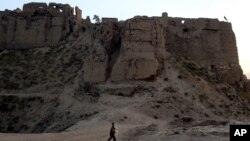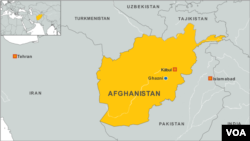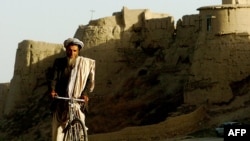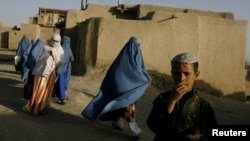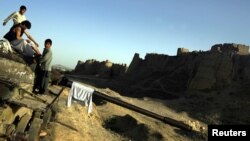Once filled with treasure-adorned minarets, grand libraries and mosques, and a towering fortress overlooking a vast empire, the ancient city of Ghazni was in the past a great center of Islamic power and culture.
But looking at it today, you would never guess that this city in central-east Afghanistan once anchored an empire that reached far and wide -- to modern-day northern India in the east, and spanning Iran to the west.
Ghazni, which means "jewel," has become a scruffy city plagued by militancy in recent times. Locals here live in fear without electricity, adequate water supplies, or a sewage system.
Consequently, in 2007, when the Islamic Educational, Scientific, and Cultural Organization (ISESCO) chose Ghazni as an Islamic Capital of Culture for the year 2013, hopes were raised that the city might be restored to its former grandeur.
With less than a year before the cultural festivals begin, however, these hopes have given way to fear that negligence and insecurity will derail the celebrations.
Every year ISESCO designates three cities - one each for Arab, African, and Asian regions - as part of its efforts to recognize Islamic cultural centers.
But some Afghan officials worry that Ghazni could be stripped of the honor if preparations are not completed for the month-long celebrations slated to begin in August 2013.
That is not what was envisioned when Ghazni was chosen as a cultural capital. The thinking was that with funding from the Afghan government and foreign donors, including UNESCO and USAID, infrastructure projects and job opportunities would follow.
Precarious Security Situation
Ashraf Ghairat, a journalist in Ghazni, accuses the central and provincial government of incompetence.
"Unfortunately, in the last few years all the projects that should have been completed haven't materialized," he says. "These projects need a long time to complete. I don't think we will have enough time because many of these projects haven't even been started yet."
Ghairat says insecurity has also hampered efforts, claiming that, out of 19 districts in Ghazni Province, the government controls only three, with the rest in the hands of Taliban militants.
He says that violence could eventually strip Ghazni of the event, regardless of whether the projects are completed.
Amid growing concerns that the project in Ghazni will not be finished in time, the speaker of the Afghan parliament, Abdul Rauf Ibrahimi, summoned Ghazni's governor and information and culture minister to parliament on June 3.
After hours of questioning, Ibrahimi concluded that both men had made "many mistakes" and ordered an independent investigation.
"A special commission will be established to investigate all these shortcomings, mistakes, carelessness, and those who are responsible," he said. "This commission should make a comprehensive report to the national assembly. After everything is cleared up, we will make a decision."
'Still Enough Time'
The Information and Culture Ministry has outlined some 65 projects that could restore some of the shine of Ghazni's heyday, when under the rule of 10th-century Emperor Sultan Mahmud Ghaznavi the city became a cultural center for poets and scholars revered throughout the Islamic world.
Ghazni plans for the event include building an airport, paving 150 kilometers of roads, building a fully functioning power grid, constructing an Islamic cultural center to house a museum and accommodate some 1,000 foreign guests, and restoring some 100 damaged historical sites.
Musa Khan Akbarzada, the governor of Ghazni Province, has downplayed the role of insecurity in the faltering development efforts.
According to him, the main reason for the problems is that various government ministries, which combined have received $10 million a year from the government, have failed to spend their allocated sums and therefore that funding has been returned to Kabul.
"From 2007 until now, many government ministries have failed to embrace the project in Ghazni," he says. "If you see the budget, you will see that many ministries didn't undertake any project."
Akbarzada, who admits many of the 65 projects have not been completed, says that he has had to cut the number of undertakings to about half in order to defer resources to the most important ones.
Akbarzada says some 50 kilometers of road have been paved in the city and a dozen historical sites have been restored, while the construction of Ghazni airport and the Islamic cultural center has begun in earnest in the last few weeks.
Information and Culture Minister Saeed Makhdoom Rahim admits the current situation is undesirable.
He accepts that many of the organizers, including himself. must take some blame, but insists that there is still enough time to ensure Ghazni is a success.
"God willing, despite every shortcoming, even if I was to blame for all of them, we still have time," he says. Our pain is great. We have learned lessons from our failures and our window of opportunity is not so short."
| This article originally appeared at RFE/RL |




